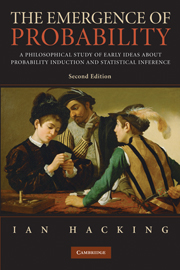 The Emergence of Probability
The Emergence of Probability Book contents
- Frontmatter
- Contents
- Introduction 2006
- 1 An absent family of ideas
- 2 Duality
- 3 Opinion
- 4 Evidence
- 5 Signs
- 6 The first calculations
- 7 The Roannez circle (1654)
- 8 The great decision (1658?)
- 9 The art of thinking (1662)
- 10 Probability and the law (1665)
- 11 Expectation (1657)
- 12 Political arithmetic (1662)
- 13 Annuities (1671)
- 14 Equipossibility (1678)
- 15 Inductive logic
- 16 The art of conjecturing (1692[?] published 1713)
- 17 The first limit theorem
- 18 Design
- 19 Induction (1737)
- Bibliography
- Index
- Frontmatter
- Contents
- Introduction 2006
- 1 An absent family of ideas
- 2 Duality
- 3 Opinion
- 4 Evidence
- 5 Signs
- 6 The first calculations
- 7 The Roannez circle (1654)
- 8 The great decision (1658?)
- 9 The art of thinking (1662)
- 10 Probability and the law (1665)
- 11 Expectation (1657)
- 12 Political arithmetic (1662)
- 13 Annuities (1671)
- 14 Equipossibility (1678)
- 15 Inductive logic
- 16 The art of conjecturing (1692[?] published 1713)
- 17 The first limit theorem
- 18 Design
- 19 Induction (1737)
- Bibliography
- Index
Summary
To understand the new kind of evidence delineated in the preceding chapter we must not look at the physicists competing for demonstrative knowledge but at the purveyors of opinion whom I have called the low scientists. The early empirics whom Francis Bacon so denigrated were chiefly alchemists, astrologers, miners and physicians. Every man endowed with lively curiosity pursued every trade, so there is no sharp division into high and low. Cardano, the author of the first book on probability, was famed both for his skill in medicine and his talent at mathematics, but for all the breadth of his interests he can safely be called a student of the low sciences. Copernicus, well versed in medical lore, was a high scientist. However we may quarrel about individuals we can often alot a given piece of work to one category or the other.
Herbert Butterfield has rightly warned that scholars who try to theorize about alchemy ‘become tinctured with the kind of lunacy they set out to describe [1957, p. 129]. If we could study the high science of the Renaissance – Copernicus, say – we might stay quite sane. But probability emerges from low science. In recounting the work of the empirics it is of no value sedately to say that they combine science and occultism, and then leave out the ‘occult’. We must instead try to absorb an alien conceptual scheme.
- Type
- Chapter
- Information
- The Emergence of ProbabilityA Philosophical Study of Early Ideas about Probability, Induction and Statistical Inference, pp. 39 - 48Publisher: Cambridge University PressPrint publication year: 2006
